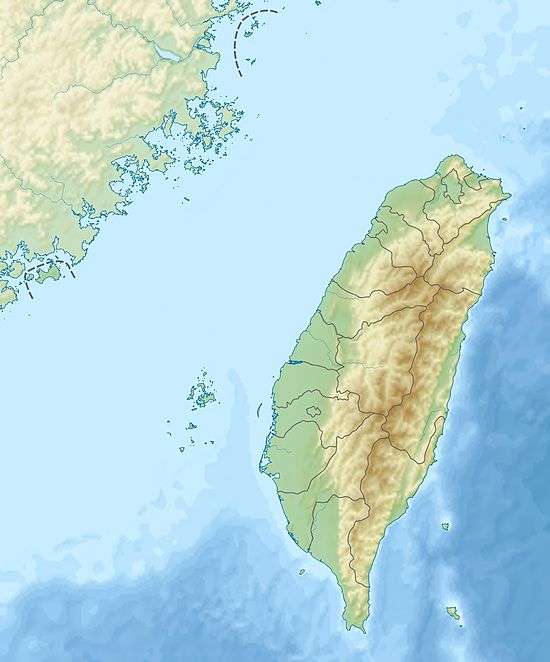Jinshan Nuclear Power Plant
| Jinshan Nuclear Power Plant | |
|---|---|
|
| |
 Location of Jinshan Nuclear Power Plant | |
| Official name | 金山核能發電廠 |
| Country | Republic of China |
| Location | Chin Shan Village,[1] Shimen, New Taipei[2] |
| Coordinates | 25°17′9″N 121°35′10″E / 25.28583°N 121.58611°ECoordinates: 25°17′9″N 121°35′10″E / 25.28583°N 121.58611°E |
| Status | Operational |
| Commission date |
10 December 1978 (Unit 1) 15 July 1979 (Unit 2)[3] |
| Decommission date |
December 2018 (Unit 1) - Planned July 2019 (Unit 2) - Planned[4] |
| Owner(s) | Taipower |
| Nuclear power station | |
| Reactor type | BWR-4 |
| Power generation | |
| Units operational | 2 x 604 MW |
| Nameplate capacity | 1,208 MW |
| Capacity factor | 85.0% |
| Annual output | 9,000 GW·h |
The Jinshan Nuclear Power Plant or Chin Shan Nuclear Power Plant[5] (金山核能發電廠), First Nuclear Power Plant (第一核能發電廠 or 核一), is a nuclear power plant in Shimen, New Taipei, Taiwan. Commissioned in 1978 for its first nuclear reactor, the plant is Taiwan's first nuclear power plant as well as Taiwan's smallest nuclear power plant.
Generation
The power plant can generate 9 billion kWh of electricity per year.[6]
The two spent fuel pools at the plant have 3,074 and 3,076 control rods respectively with a maximum storage of 3,083 rods per pool.[7]
Decommissioning plan
Taipower, as the operator of the power plant, was required by the Radiation Monitoring Center of the Atomic Energy Council to hand in the 2018 decommissioning plans for the plant by December 2015 for the authority to review all of the plans before the decommissioning date. Once the reactors have been shut down, the plant should be dismantled within 25 years.[2]
Taipower plans to allocate NT$18.2 billion for the disposal of nuclear waste from the decommissioned plant over the next 25 years. Currently Taipower is doing feasibility study of building a nuclear waste storage facility on an uninhabited island around Taiwan.[8]
Events
2013
The July 2013 Typhoon Soulik caused a trip to the generator and turbine of the power plant Unit-2 because one suspension ground line failed and hit the transmission line when the typhoon hit the island on 13–14 July. The typhoon also caused the seawater inlet to be blocked by large amount of debris and damaged three fine filters, traveling filter rake and the plant's switchyard. The damage caused the plant to be offline for several days.[9][10]
In August 2013, it was reported that there might have been radioactive water leaks for three years from the storage pools of the nuclear power plant's two reactors. Official from Taipower said that the water might come from different sources, such as condensation water or water used for cleaning up the floors. The water however has been collected in a reservoir next to the storage pools used for spent nuclear rods and has been recycled back into the storage pools, thus is claimed to pose no threat to the environment.[11]
In December 2013, the circulating pump of the second reactor tripped due to the low lube oil pressure which caused a built-in lube oil pump. The Atomic Energy Council was criticized due to their very slow respond in giving answers to the public only 10 hours after the trip.[12]
2014
On 10 December 2014, two reactors were deactivated for annual maintenance operation.[13]
On 28 December 2014, the number 1 reactor of the plant was shutdown and went out of service due to a component failure.[14]
2015
On 16 May 2015, an air conditioning unit in the seawater pump house of the plant caught fire. The fire was put out immediately and did not cause any safety concern or affect the power generation.[15]
2016
On 10 March 2016, a reactor of the plant was shut down due to a higher than normal water level caused by negligence from the plant employees who inadvertently touched a power button. Safety inspection was completed on 14 March 2016 and the plant resumed its operation.[16]
On 4 August 2016, smoke rose out from the power plant resulted from unstable voltage frequency which caused external circuit breakers to trip and produced smoke.[17]
2017
On 2 June 2017, a reactor of the plant tripped after a transmission tower on a nearby hilltop toppled due to heavy rain. The second reactor was subsequently shut down automatically as a safety measure.[18]
See also
- Energy in Taiwan
- List of power stations in Taiwan
- Nuclear power in Taiwan
- Electricity sector in Taiwan
References
- ↑ "GE Energy to Supply Monitoring and Control Systems for Taiwan Nuclear Power Plant". Business Wire. 2005-02-23. Retrieved 2014-05-01.
- 1 2 "Taipower working towards decommissioning of Chinshan Nuclear plant - Power Insider AsiaPower Insider Asia". Pimagazine-asia.com. Retrieved 2014-05-01.
- ↑ "Taiwan Nuclear Power". World-nuclear.org. Retrieved 2014-05-01.
- ↑ http://www.chinapost.com.tw/taiwan-business/2016/07/14/472166/First-Nuclear.htm
- ↑ "Chin Shan Nuclear Power Plant". Power Technology. 2011-06-15. Retrieved 2014-05-01.
- ↑ "Taipower mulls extending use of three nuclear plants". Taipei Times. 2014-04-24. Retrieved 2014-05-01.
- ↑ "Nuclear power rotation plan mulled".
- ↑ "Taipower mulling plan for nuclear waste treatment".
- ↑ "Taiwan’s Chinshan-2 Faces Repairs After Typhoon Shutdown". Nucnet.org. 2013-06-25. Retrieved 2014-05-01.
- ↑ "Taiwan reactor offline after typhoon". World-nuclear-news.org. 2013-07-16. Retrieved 2014-05-01.
- ↑ 08/09/2013 12:07 am EDT (2013-08-09). "Taiwan's First Nuclear Power Plant In Shihmen May Have Been Leaking Radioactive Water For 3 Years". Huffingtonpost.com. Retrieved 2014-05-01.
- ↑ "AEC criticized on Jinshan plant safety". Taipei Times. 2014-04-24. Retrieved 2014-05-01.
- ↑ http://www.chinapost.com.tw/taiwan/national/national-news/2015/04/29/434717/Natural-gas.htm
- ↑ "Reactor shut down after fire at 3rd nuclear power plant (update)".
- ↑ "Air conditioner at nuclear power plant catches fire".
- ↑ "Taipower apologizes over nuclear power plant mishap".
- ↑ http://www.chinapost.com.tw/taiwan/2016/08/06/474618/Smoke-at.htm
- ↑ Huang, Li-yun; Hsu, Elizabeth (2 June 2017). "Nuclear reactor trips as electric pylon falls during rain". Focus Taiwan. Retrieved 2 June 2017.